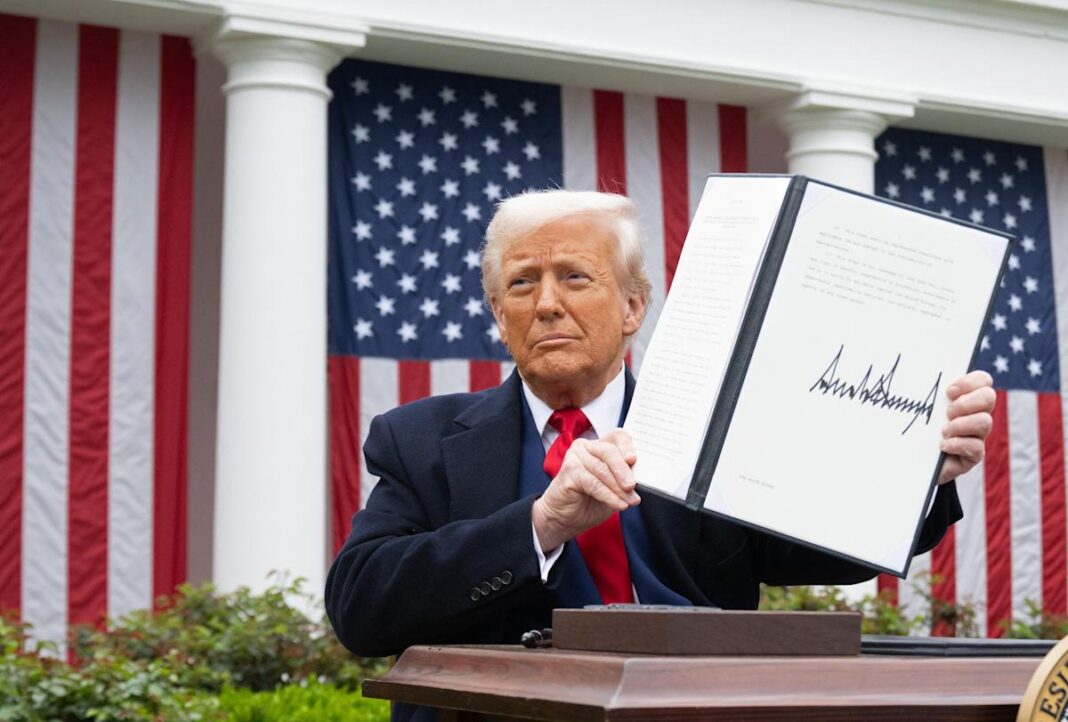Trump Acknowledges the Impact of Tariffs on American Consumers
In a notable shift during a recent media interaction in the Oval Office, President Trump admitted that U.S. consumers are “paying something” due to the tariffs imposed under his administration. This acknowledgment comes amid ongoing scrutiny of his tariff regime, which is currently under review by the U.S. Supreme Court.
Tariffs: The Consumer Impact
While Trump maintains that Americans are “gaining tremendously” from the overall economic impact, economists largely argue that the tariffs function as a tax burden on consumers. The president’s recognition suggests a growing awareness of the contentious effects of tariffs, especially as they pertain to the average American shopper, who feels the strain through higher prices on imported goods.
This development marks an important moment in the discourse surrounding tariffs, hinting at a possible reevaluation of the administration’s stance as it faces legal challenges. The tariffs, initially framed as a means to protect U.S. industries, are now being scrutinized through the lens of their financial impact on everyday citizens.
Supreme Court Scrutiny
The Supreme Court recently deliberated on the tariffs’ legal standing. During oral arguments, justices from both the liberal and conservative spectrums expressed skepticism about Trump’s authority to impose such sweeping duties unilaterally. The implications of their decision could be far-reaching, affecting not just current tariffs but the future landscape of American trade policy.
For instance, Chief Justice John Roberts pointedly remarked that tariffs effectively act as taxes paid by Americans, a statement that underscores the burden placed on consumers. This critical observation could shape the court’s ruling, which many analysts believe may challenge the foundation of Trump’s trade policies.
Economic Stakes and Uncertainty
Treasury Secretary Scott Bessent, present at the hearing, declared optimism about the administration’s chances in the legal battle. Should the court rule against Trump, however, the administration is expected to pursue alternative methods to advance its trade agenda, hinting at a persistent effort to reclaim authority in the trade realm.
Trump himself has articulated the stakes involved, labeling the court’s decision as “literally LIFE OR DEATH for our country.” This declaration reflects not only his vested interest in the outcome but also the potential economic ramifications that could ensue depending on the ruling.
The Broader Trade Landscape
The current trade dynamics remain complex. Recently, the U.S. and China reached a tentative agreement that would see a pause on certain punitive tariffs, particularly in the technology and shipping sectors. China, in response, is easing export restrictions on rare earth metals, which are essential for various industries, signaling a potential thaw in relations that could be advantageous for both economies.
Conversely, the landscape for U.S. businesses continues to shift as various sectors, particularly the auto and tech industries, grapple with the burdens imposed by tariffs. Companies like Honda have reported a dip in profits, directly attributing difficulties to the tariffs that elevate costs on imported parts and materials.
The Road Ahead
Ultimately, the fate of Trump’s tariffs is intertwining with legal, economic, and diplomatic threads. The Supreme Court’s forthcoming decision will not only influence tariffs but could reshape public sentiment around trade policies. As the debate rages on, consumers and businesses alike are left navigating not only the current landscape but also the uncertainty of what lies ahead.
In this rapidly evolving situation, it is evident that the intersection of tariffs, consumer prices, and international trade agreements will remain a focal point in both domestic and global economic discussions, as both the administration and the public await the court’s ruling.



